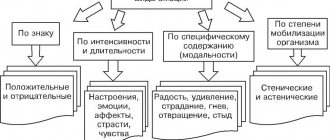They say different things about emotions: some say that “emotions interfere with life,” others complain about their hyper-emotionality, while others, against the backdrop of now popular books and articles on the topic of emotional intelligence, are trying to increase not only IQ (intelligence quotient), but also EQ ( emotionality quotient)… Emotions themselves are an irreplaceable thing, but sometimes they are too strong - and this harms both their “owner” and others.
I don’t really like the expression “keep emotions under control” (I see some kind of pressure on the individual in it), but the fact remains: it is possible and necessary to control emotions and feelings.
The ability to control yourself and maintain a clear mind and free from momentary outbursts of emotions is valued in any situation and in any place: both at work and in the family. I propose today to reflect on this topic: how to learn to control yourself?
Self-control, or the Art of Balance
Guitarists know that loose or overstretched strings will lose their “voices.” To put the tool into working condition, you need to configure it correctly. The main thing in this matter is to achieve a golden mean.
The same thing happens with a person. The ability to control oneself is the correct emotional attunement. Excessive nervous tension, as well as excessive relaxation, does not allow you to achieve your goal.
Emotions that get out of control can destroy the warmest relationships. Aggression, fear, hatred in a stressful situation paralyze a person’s will and do not allow him to behave adequately. You can make reasonable decisions and correct your actions only in a balanced state.
Moreover, self-control sometimes makes it possible to discern favorable opportunities in a dead-end situation that lead to the path of success.
Be the master of emotions: suppress or manage?
Many people confuse and believe that suppressing and managing their emotions are the same thing..
To suppress means not to consider them important, not to pay attention, to forbid oneself to understand what is happening to me.
Managing emotions means showing them in the right place: after all, sometimes they are inappropriate, can offend other people, and do not allow you to calmly think about the situation.
Controlling your emotions also means understanding and taking into account that sometimes too intense emotions are a consequence of lack of sleep, hunger, fatigue, illness...
Where self-control skills are required:
• conflicts between friends: quarrels, disagreements;
• crises of family relationships: infidelity, divorce, the problem of mutual understanding between generations;
• public discussions: defending one’s position at meetings, lectures, consultations;
• scientific experiments: trial and error methods are not always successful;
• force majeure situations: fire, flood, equipment failure, injuries;
• diplomacy: the art of negotiating, giving in, compromising.
Emotional leadership. The art of managing people based on emotional intelligence
Daniel Goleman, Richard Boyatzis, Annie McKee
Publishing house Alpina Publisher, 2021
A leader's emotions play a critical role in a team's success because they are truly contagious! The general mood depends on the manager, because if he does not believe in success, does not radiate energy and does not enjoy what he does, expecting enthusiasm from employees is at least stupid, and at most unfair. How to become a leader who will lead to prosperity is in this book.
What is self-control?
The art of self-control allows you to not be a slave to your emotions. Having mastered its basics, a person becomes less vulnerable and more self-sufficient; in any situation he knows how to cope with anger, anxiety, confusion, and self-doubt.
In a word, this is a good school that allows you not to be afraid of life's trials. Psychologists advise going through it as early as possible and suggest the following stages in mastering self-control skills.
1. Self-control in conflict situations
You can use minor everyday quarrels as training exercises. Try to analyze your behavior: how hot and angry you are. Identify the reasons for your excessive temperament.
How to remain human at work. All facets of emotional intelligence
Daniel Goleman
Publishing house Mann, Ivanov and Ferber, 2019
A collection of the best Harvard Business Review articles compiled by Goleman. All materials are dedicated to emotional intelligence and at the same time focused on its use in professional activities and on the human aspects of work. After all, we interact with others too often as part of our work to let things slide.
Techniques for developing self-control:
• music therapy as a practice of optimizing internal reserves;
• meditation, teaching you to control emotions;
• art therapy, relaxing, distracting from obsessive thoughts and filling with life-giving energy;
• diaphragmatic breathing, which allows you to relieve tension and quickly calm down.
Mental balance, which everyone strives for, but only a few achieve, is a god-like state . It gives strength to overcome internal problems and overcome external obstacles. With him, insidious difficulties recede and goals are achieved. Thanks to him, thoughts become clearer and feelings calm down. Weaknesses, fears and complexes are afraid of him like fire. Without it there can be no self-improvement.
Having mastered the ability to control oneself and achieve mental balance, a person enters a time of true maturity. The boiling of passions is a sign of youth. However, if you spend your whole life being upset and beating yourself up over trifles, you can remain a yellow-haired youth until you turn gray.
LiveJournal
- Related Posts
- Fundamentals of spiritual and moral development
- How to change for the better
- Spiritual and intellectual development
« Previous entry
Emotional intelligence at work
Daniel Goleman
Publishing house Mann, Ivanov and Ferber, 2020
Goleman again! This time, not a collection of articles, but a book entirely written by the author, but on the same topic - interaction with one's own and others' emotions in the workplace. With Goleman's first book we learned to understand ourselves, with the second we learn to understand the feelings and emotions of others to a greater extent in order to remain an effective employee, a true team player and make a dizzying career.
Mirror for heroes
It is clear that all people are different. Some people cannot be broken by even the most difficult trials, while others can be overwhelmed by any little thing, a mere trifle. Some people cope with failures quite easily, know how not to get “stuck” in them, and are able to learn from their mistakes. And some cannot muster the will to resist everyday troubles. Even small obstacles unsettle such a person, he gives up, gives up without a fight and, of course, is very worried about this. Those around him see his uncertainty and draw appropriate conclusions. Looking at yourself from the outside, have you discovered that you belong to the second category? Don't worry, this is not a death sentence at all. Simple techniques of self-control will help you avoid failures. I'll tell you about the most important and effective ones.
EQ. Emotional intelligence in practice
Justin Bariso
Bombora Publishing House, 2019
Justin Bariso, a famous speaker and consultant, in his book formulated 10 rules of EQ, following which you will learn to redirect your own emotions in a more creative direction, build healthy relationships with people, respond correctly and constructively to any feedback, effectively identify manipulation and deal with it .
How to quickly calm down in a stressful situation
“There is space between stimulus and response. In this space, our power is to choose our response. Our answer is our growth and our freedom.” ~ Viktor Frankl
We tell ourselves big lies during stressful times.
It makes us feel lost, scared and unloved, as if we are helplessly being carried away and carried away by a storm.
Our heads can become filled with frightening images, words and stories about the cause and who is to blame for our unwanted pain.
Sound familiar? If yes, then you are not alone. Are You Normal. This is how a person biologically reacts to stress.
So what's the big lie?
The big lie is that we cannot control our response to stress. Actually yes. Great control.
I've had my fair share of difficult times. I had problems with money and work, I struggled with my health, and I faced relationship difficulties.
But that's not the worst part. The worst part is that I grew up to be a very sensitive person who reacted internally to almost anything that could be interpreted as negative.
Of the feelings listed above, I sat hopelessly on the edge of “feeling them all.”
That was until a particularly difficult relationship caused me so much stress and anxiety that I became fed up with my unconscious reactions and vowed to do whatever I could to stop (or alleviate) them.
Through research and lots of experimentation, I created a practical way to instantly calm myself anywhere and anytime when a meditation pillow or calming book was out of reach.
The technique was so simple and powerful that it pulled me through a painful experience in that relationship and has connected me through many experiences since.
It's easy to remember, has an immediate impact on your mind and body, and most importantly, is simple enough to remember and use when you're going through your own stress storms.
How to calm down in two minutes
Take a moment to get comfortable and try these four steps for yourself:
1.Freeze yourself.
Remember a game you played as a child when you suddenly stopped halfway through, as if you were frozen in ice? Do it now. Stop body parts, emotions and thought processes. Imagine yourself as a cartoon character who has been shot with a stun gun. You can even make it a little dramatic if that helps.
Focus on your index finger.
(go to this if you find it difficult to take the first step). For twenty to sixty seconds, focus solely on the back of your index finger. Allow your mind and body to be absorbed.
Bring it closer to you. Study the rivets, folds and those tiny fingerprints. If you have a noisy environment, allow the sounds around you to merge into a single background hum and let it fade from your attention.
Take a conscious breath.
Release the focus and come back to your body. Take a deep, conscious breath, then let it pass through your mouth, slowly and calmly, creating a wave of relaxation that begins in your chest and spreads through your being to the surface of your skin.
Look around consciously.
As you reconnect with your surroundings, scan the scene in front of you. Keep as indiscriminate as possible in what you focus on, just as you would when you wake up in the morning.
Consciously pay attention to the thoughts that try to return to your head and observe them with curiosity.
How do you feel?
You may now feel a little more in touch with your feelings, distanced from previous thoughts and connected to the present moment.
Most importantly, you will realize that the root of your discomfort is your thoughts. Everything else, such as emotions, physical discomfort and pain, starts from here.
If you have trouble slowing down your mind at first, try this: If you meditate regularly, spend the last minute of the session focusing on the same finger, in the same way. This will link (or anchor) feelings of clarity, relaxation, and connectedness to action.
And if you don't meditate, now is the time to start! This will help you cope with stressful situations in general and will greatly improve the effectiveness of this technique.
Why this method works
Stress is mental or physical tension that manifests itself in your relationship with the flow of thoughts in your head.
Mindfulness allows you to step out of the procession and watch it pass by without being swept down the fast-flowing river.
When we are being pulled down by a heavy current, our emotions and body react as if the danger or pain contained in the thought is real, immediate, and must be dealt with now. This is why we feel discomfort even when someone reminds us of a stressful situation that we tried to forget.
Reconnecting with the present reminds us that here is the only time there really is.
Focusing on the hands is an ancient Ayurvedic practice that helps ground the soul and provide stability to the physical body.
Try it yourself
The most important reason this technique works is that it gives you something back: control.
We may not be able to choose what happens to us in our lives, but as Viktor Frankl says, we can always choose our response.
Try it the next time you feel yourself panicking (and be sure to let us know how you do in the comments below).
About Jonathan Allen
Jonathan Allen is an Australian writer who loves turning big ideas into practical wisdom. You can read his blog at The Galilei, where he tests spiritual wisdom, pokes fun at himself, and shares real-world techniques to help people live healthier, happier, and more connected lives.
Noticed a typo or inaccuracy? Contact us so we can fix it! .
The Chimpanzee Paradox. How to manage your emotions to achieve your goals
Steve Peters
Bombora Publishing House, 2019
The author of the book, a psychologist and professor, offers an innovative method of brain control that helps bring the psychological state into ideal shape and create readiness for high results.
His approach is based on the metaphor of Man (mind) and Chimpanzee (emotions), who constantly fight each other in the human brain for dominance. The secret of success is in taming the Chimpanzee, to which the book is dedicated. Storytel is an international audiobook subscription service. The Storytel library contains audiobooks of almost all genres, from classics and non-fiction to lectures, stand-ups and podcasts. This is a service that solves the reading problem. It allows you to listen to audiobooks anytime, anywhere: while working out, while cooking, on the way to and from work, on the plane, before bed, and whenever else. Storytel creates and records its own unique content - lecture projects, podcasts, audio series, and also collaborates with the best voices in the country.










